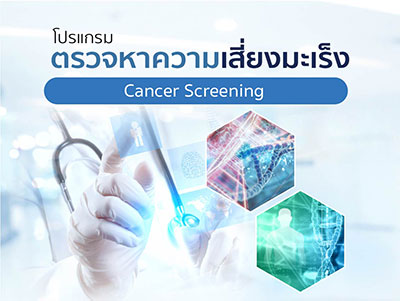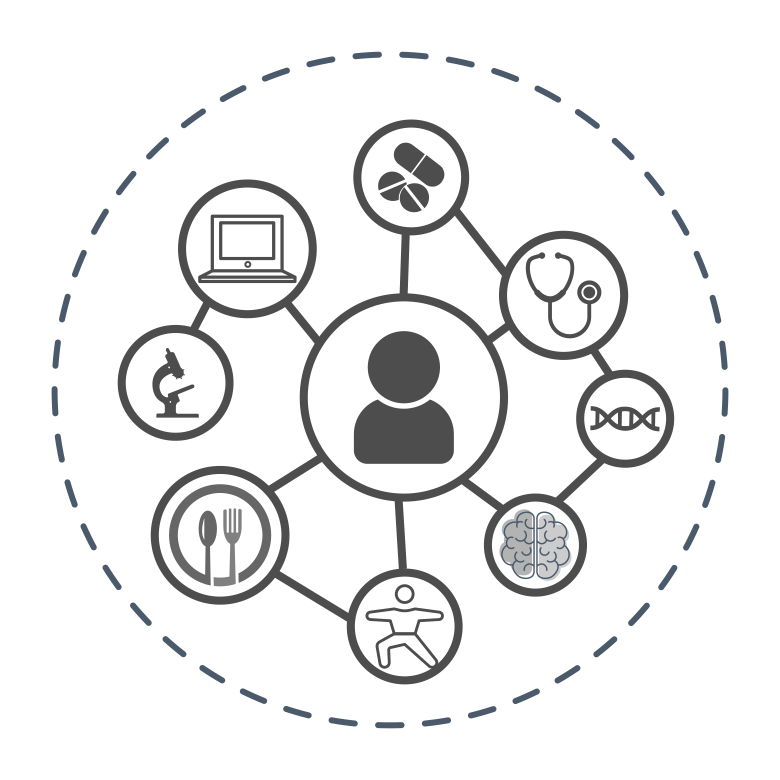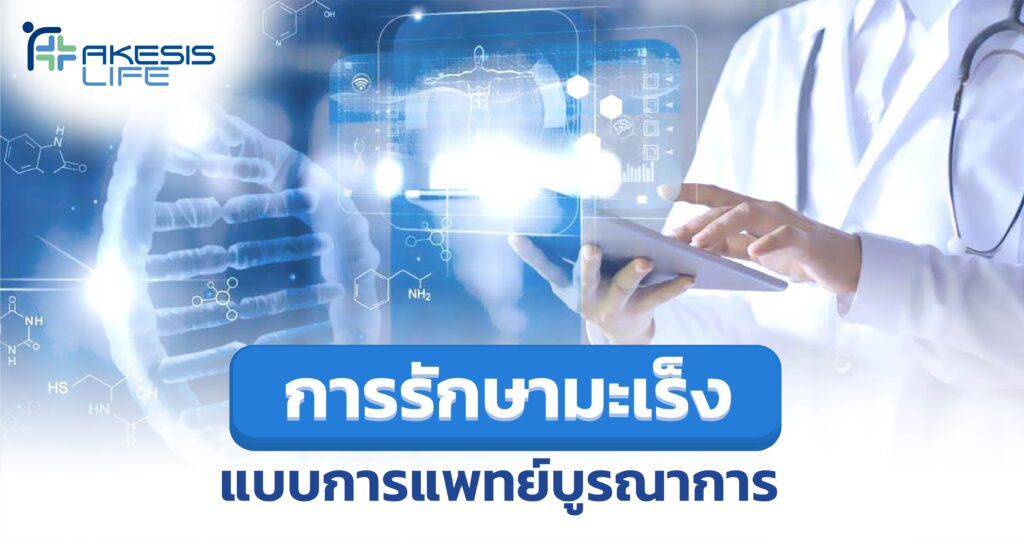รักษามะเร็งแบบบูรณาการ
“มะเร็ง” โรคร้ายยอดฮิตที่ยังคงมีอัตราของผู้ป่วยเพิ่มมากขึ้นในทุก ๆ ปี และเมื่อแพทย์ลงความเห็นอย่างแน่ชัดแล้วว่าคนไข้เป็นมะเร็งแน่นอน สิ่งแรกที่ทุก ๆ คนทำก็คือ การหาวิธีและแนวทางการรักษา ซึ่งส่วนใหญ่ก็จะว่ากันด้วยเรื่องของการผ่าตัด การฉายแสง และการทำเคมีบำบัด
แต่เดี๋ยวนี้ยังมีการรักษาและฟื้นฟูโรคมะเร็งอีกแบบหนึ่ง ที่ทุกคนให้ความสนใจ และหันมาใช้เป็นทางเลือกในการรักษามากยิ่งขึ้น ซึ่งวิธีการรักษาแบบนี้เราเรียกกันว่า “การแพทย์แบบบูรณาการ”
ซึ่งการรักษาด้วยแนวทางนี้ จะฟื้นฟูคุณภาพชีวิตและยืดอายุผู้ป่วยไปได้อีกยืนยาว ซึ่งเราผสมผสานวิธีการรักษาทั้งการใช้องค์ความรู้เกี่ยวกับเซลล์มะเร็ง นวัตกรรมการรักษาที่ทันสมัย ธรรมชาติบำบัดควบคู่กับการรักษาหลัก เพื่อให้การรักษาครอบคลุมและเกิดประสิทธิภาพสูงสุด
6 มิติ การบำบัดมะเร็งแบบบูรณาการ
เมื่อกล่าวถึง การรักษามะเร็ง หลายคนอาจจะนึกถึงเพียง การผ่าตัด การทำเคมีบำบัด หรือการฉายแสง ซึ่งในความเป็นจริงแล้ว ในการที่เราจะต้องดูแลหรือรักษาผู้ป่วยมะเร็งนั้น การใช้เทคนิคหลักเพียง 3 อย่างนี้ อาจจะไม่เพียงพอ การแพทย์บูรณาการจึงเข้ามามีบทบาท เพื่อที่จะมาเติมเต็มการรักษาผู้ป่วยมะเร็ง ยกตัวอย่างเช่น การกำจัดสารพิษ อันเนื่องมาจาก การสะสมของสารพิษในร่างกาย รวมไปถึงการใช้สารอาหาร สารสกัดจากพืช สมุนไพร หรือวิตามิน ที่จะเข้าไปช่วยเพิ่มประสิทธิภาพให้กับยีนส์บางยีนส์ที่บกพร่องอยู่ให้ทำงานได้ดีขึ้น โดยเฉพาะยีนส์สำหรับการกำจัดสารพิษ แม้กระทั่ง การส่งเสริมประสิทธิภาพของภูมิคุ้มกัน ซึ่งถือว่าเป็นหัวใจหลักอย่างหนึ่งในการรักษาโรคมะเร็งเลยทีเดียว เพราะเม็ดเลือดขาวหรือภูมิคุ้มกัน เป็นเสมือนกุญแจด่านสำคัญที่จะคอยกำจัดเซลล์แปลกปลอม กำจัดเซลล์มะเร็ง เพื่อป้องกันไม่ให้เซลล์มะเร็งที่รักษาไปแล้วนั้นกลับมาเป็นใหม่ได้อีก
เราไม่ได้รักษาแค่ร่างกาย แต่เราจะเจาะลึกถึงการรักษาจิตใจ เพื่อสนับสนุนส่งเสริมจิตใจของผู้ป่วยให้มีกำลังใจสู่กับโรค เพิ่มคุณภาพชีวิตที่ดี และเพิ่มโอกาสในการรอดชีวิตจากมะเร็งได้
การรักษามะเร็งแบบบูรณาการ จะเป็นการผสมผสานวิธีการรักษาทั้งการใช้องค์ความรู้เกี่ยวกับเซลล์มะเร็ง นวัตกรรมการรักษาที่ทันสมัย ธรรมชาติบำบัดที่สามารถทำควบคู่กับการรักษาหลักได้ เพื่อให้การรักษาครอบคลุมและเกิดประสิทธิภาพสูงสุด ได้แก่
1. ล้างสารพิษบำบัด
การล้างพิษนั้นมีความสำคัญเป็นอย่างมากต่อการบำรุงซ่อมแซมร่างกายผู้ป่วยมะเร็ง ทั้งก่อน ระหว่างและหลังจากการรักษามะเร็ง เพราะสารพิษที่สะสมในร่างกายจำนวนมาก คือต้นตอหลักของการเกิดมะเร็งนั่นเอง โดยเฉพาะผู้ป่วยบางรายที่เคยรับเคมีบำบัดและการฉายรังสีมาก่อน จะรู้สึกว่าร่างกายมีสารพิษเยอะ และร่างกายต้องการกำจัดสารพิษออกไป
สารพิษจะสร้างความเสียหายต่อเซลล์ซึ่งจะเป็นการกระตุ้นระบบภูมิคุ้มกันในการกำจัดเนื้อเยื่อที่ถูกทำลาย กระบวนการนี้จะส่งผลให้มีการปล่อยสารการอักเสบในร่างกายออกมาเป็นอย่างมากเพื่อให้ร่างกายกำจัดเนื้อเยื่อที่ถูกทำลายเหล่านี้ ส่งผลให้ผู้ป่วยอาจมีอาการปวดตามข้อ กล้ามเนื้อ ปวดหัว อ่อนเพลีย ท้องอืด อารมณ์แปรปรวนได้ อาการเหล่านี้เรียกว่าเป็นอาการที่บอกถึงสารพิษที่อยู่ในร่างกาย อาการจะค่อยๆบรรเทาลงเมื่อเวลาผ่านไป
ในขณะที่การกำจัดสารพิษ จะช่วยเสริมและกระตุ้นให้กระบวนการกำจัดสารพิษออกมาจากร่างกายได้เร็วและมีประสิทธิภาพมากยิ่งขึ้น
2. ภูมิคุ้มกันบำบัด
ภูมิคุ้มกันบำบัด มีความสำคัญอย่างมากในการรักษามะเร็ง เนื่องจากการเผชิญกับความเครียด แรงกดดันจากสภาวะแวดล้อมของเซลล์ที่ไม่เหมาะสมจนทำให้รหัสพันธุกรรมเกิดการผิดเพี้ยน จึงเกิดการเปิดยีนมะเร็ง เมตาบอลิซึมเปลี่ยนไป และเกิดการกลายพันธุ์จนกลายเป็นเซลล์มะเร็ง
โดยปกติร่างกายของคนเรามีกลไกของเม็ดเลือดขาวหรือระบบภูมิต้านตรวจสอบเซลล์ที่มีการแบ่งตัวผิดปกติ อย่างเซลล์มะเร็ง เมื่อตรวจพบจะทำลาย แต่ถ้าระบบภูมิคุ้มกันไม่แข็งแรง ย่อมทำลายเซลล์มะเร็งไม่ได้ หรือระบบภูมิคุ้มกันแข็งแรง แต่ตรวจไม่พบเซลล์มะเร็ง เนื่องจากเซลล์มะเร็งจะมีการเปลี่ยนแปลงลักษณะของเซลล์มะเร็ง เพื่อหลบหลีกไม่ให้ระบบภูมิคุ้มกันสามารถตรวจสอบหรือทำลายเซลล์มะเร็งได้ หรือเซลล์มะเร็งมีการส่งข้อมูลไปยังสเต็มเซลล์ในไขกระดูกของคนเรา จึงทำให้เซลล์ของระบบภูมิคุ้มกันที่ผลิตขึ้นมาเป็นเซลล์ประเภทออกฤทธิ์กดภูมิคุ้มกัน จึงไปยับยั้งการทำงานในการผลิตระบบภูมิคุ้มกันประเภทต่าง ๆ อาทิ เอ็นเคเซลล์ (Natural Killer Cell) ไซโตท็อกซิกทีเซลล์ (Cytotoxic T cell) ทีเฮลเปอร์เซลล์ (T helper cell) ซึ่งเหล่านี้เรียกว่า ภาวะการหลบหลีกของเซลล์มะเร็งจากระบบภูมิคุ้มกัน (Cancer Immune Surveillance)
ภูมิคุ้มกันบำบัด คือกลไกที่ช่วยแก้ปัญหาจากภาวะเซลล์มะเร็งทำให้ระบบภูมิคุ้มกันไม่สามารถทำงานได้มีประสิทธิภาพ รวมถึงจากพฤติกรรมการใช้ชีวิตของผู้ป่วย เช่น การอดนอน พักผ่อนไม่เพียงพอ มีสารพิษในร่างกาย มีการติดเชื้อแอบแฝง ทำให้ภูมิคุ้มกันไม่แข็งแรง และจากกรณีที่เซลล์มะเร็งมีการเปลี่ยนแปลงลักษณะโครงสร้างเพื่อหนีการตรวจจับ จึงทำให้ระบบภูมิคุ้มกันเกิดความผิดพลาด และด้วยประเด็นต่าง ๆ เหล่านี้ จึงทำให้เซลล์มะเร็งมีการเจริญเติบโต เพิ่มจำนวน และแพร่กระจายจนเป็นมะเร็ง
เพราะฉะนั้น ภูมิคุ้มกันบำบัดจึงเป็นกลไกที่เข้ามาแก้ไขปัญหาต่าง ๆ ข้างต้น เพื่อให้ระบบภูมิคุ้มกันสามารถกลับมาทำงานเพื่อตรวจสอบเซลล์ที่ผิดปกติได้ และสามารถเพิ่มจำนวนของระบบภูมิคุ้มกัน พร้อมสามารถสร้างสารภูมิคุ้มกันเพื่อใช้ในการกำจัดเซลล์มะเร็งได้ดีขึ้น พร้อมทั้งเปลี่ยนขั้วการทำงานของมะเร็งให้เป็นลักษณะที่เราสามารถต่อสู้กับเซลล์มะเร็งได้
3. การบำบัดที่ออกฤทธิ์จำเพาะเจาะจงทำลายเซลล์มะเร็งแบบไม่เป็นพิษ
คือการรักษาอีกรูปแบบหนึ่งซึ่งแพทย์ผู้รักษาจะมีการเลือกการนำสารต่างๆ ที่สกัดจากธรรมชาติ รวมถึงการใช้ความร้อน แสง พลังงานบำบัด ซึ่งมีฤทธิ์ในการทำลายเซลล์มะเร็ง มาร่วมรักษากับแพทย์แขนงหลัก เพื่อเพิ่มประโยชน์สูงสุดในการรักษา
การบำบัดด้วยวิธีนี้นับเป็น การรักษาที่ตอบโจทย์และมั่นใจได้ว่าจะไม่มีผลข้างเคียง ที่เป็นอันตรายต่อเซลล์อื่นๆในร่างกายของผู้ป่วยที่ไม่ใช่เซลล์มะเร็ง เมื่อเทียบกับการรักษาด้วยวิธีทั่วไป
4. โภชนบำบัด
อาหารเป็นอีกหนึ่งปัจจัยที่สามารถกระตุ้นการเจริญเติบโตของเซลล์มะเร็งได้ แนวทางการรักษาที่อคีซีส ไลฟ์ เราจึงให้ความสำคัญกับเรื่อง อาหาร เป็นอย่างมาก ผู้ป่วยมะเร็งจำเป็นต้องปรับปรับการทานอาหารใหม่ โดยหลีกเลี่ยง อาหารที่มีความหวานสูง อาหารแปรรูป แป้งขัดสี ไขมันอิ่มตัว และโปรตีนที่มาจากเนื้อสัตว์ เน้นการทานอาหารที่มาจากพืช ผัก และผลไม้ โดยเรามีเชฟที่มีประสบการณ์ในการดูแลอาหารผู้ป่วยมะเร็งโดยเฉพาะ ที่จะคอยแนะนำเมนูอาหารให้ มีกิจกรรมสอนทำอาหาร ที่ช่วยสอนวิธีทำอาหารเมนูง่ายๆ ทานกันในครอบครัว เพราะสมาชิกในครอบครัวมีบทบาทในการช่วยปรับเปลี่ยนการทานอาหารของผู้ป่วยมะเร็งด้วยเช่นกัน ต้องเป็นกำลังใจให้กัน ทานเป็นเพื่อนกัน เพื่อให้ผู้ป่วยได้คุ้นเคยกับอาหาร และทานได้เป็นประจำ ซึ่งนี่ก็จะเป็นอีกหนึ่งปัจจัยที่จะช่วยเสริมการรักษาของผู้ป่วยมะเร็งให้มีคุณภาพชีวิตที่ดีขึ้น
5. การปรับพฤติกรรมการดำเนินชีวิต
ทุกๆ คนคงเข้าใจกันดีอยู่แล้วว่าปัจจัยก่อมะเร็งที่สำคัญ นอกจากปัจจัยภายในที่มาจากพันธุกรรมแล้ว พฤติกรรมการดำเนินชีวิตเป็นอีกหนึ่งปัจจัยหลักที่ก่อให้เกิดมะเร็ง การที่จะมีสุขภาพที่ดีได้นั้น ก็ต้องมาจากการที่มีพฤติกรรมการดำเนินชีวิตที่ดีเช่นกัน โดยทาง อคีซีส ไลฟ์ จะเน้นให้ความสำคัญในการปรับเปลี่ยนพฤติกรรมทั้งหมด 6 รายการ ดังนี้ เพื่อการรักษามะเร็งที่มีผลลัพธ์การรักษาที่ดีขึ้น รวมถึงการป้องมะเร็งไม่ให้กลับมาเป็นซ้ำอีกอย่างยั่งยืน
- เลือกรับประทานอาหารที่มีประโยชน์ต่อสุขภาพ
- ควบคุมความเครียด
- นอนพักผ่อนให้เพียงพอ
- ออกกำลังกายอย่างสม่ำเสมอ
- เข้ารับการบำบัดการสนับสนุนทางอารมณ์และเหตุผล
- หลีกเลี่ยงสภาพแวดล้อมที่เป็นพิษ
6. การปรับสมดุลอารมณ์ และจิตใจ
ผู้ป่วยมะเร็งที่เข้ารับการรักษาที่ อคีซีส ไลฟ์ จะมีทีมแพทย์เป็นเหมือนที่ปรึกษาส่วนตัว ช่วยออกแบบโปรแกรมการรักษาแบบเฉพาะบุคคลให้เหมาะกับผู้ป่วยแต่ละราย เพื่อให้การรักษานั้นเกิดประสิทธิภาพสูงสุด และที่สำคัญคือ เราไม่ได้ดูแลเพียงแค่สุขภาพร่างกายเท่านั้น แต่ยังดูแลในเรื่องสุขภาพจิตใจของผู้ป่วยมะเร็งด้วย ซึ่งถือว่าเป็นสิ่งสำคัญที่จะต้องดูแลไปพร้อมกัน ทั้งตัวผู้ป่วยเองและญาติ จะต้องมีกำลังใจที่ดี พร้อมยืนหยัดต่อสู้ไปด้วยกัน
อคีซีส ไลฟ์ จึงมีวิธีการบำบัดสุขภาพจิตด้วยวิธีการทำสมาธิ ที่ฝึกโดยทีมงานผู้มีประสบการณ์ การช่วยให้ผู้ป่วยผ่อนคลาย ปรับทัศนคติ เสริมสร้างกำลังใจให้ผู้ป่วยมีพลังใจที่เข้มแข็ง เพื่อคุณภาพชีวิตที่ดีต่อไป
บทความแนะนำ



วิดีโอแนะนำ
รักษามะเร็งแบบบูรณาการ
ทำไมถึงต้องใช้การรักษาแบบบูรณาการสำหรับโรคมะเร็ง ?
- ความน่ากลัวที่สุดของโรคมะเร็ง คือ ในระยะเริ่มต้น มักจะไม่มีอาการ แต่ถ้ารอจนเริ่มมีอาการ การดำเนินโรคมักเข้าสู่ระยะลุกลาม ซึ่งทำให้โอกาสในการหาย หรือตอบสนองต่อการรักษาลดลง
- การรักษามะเร็งในปัจจุบัน ยังคงมุ่งเป้าและให้น้ำหนักไปที่การกำจัดทำลายก้อนเนื้อหรือเซลล์มะเร็ง จนละเลยการดูแลระบบภูมิต้านทาน และไม่ได้แก้ไขปัจจัยต้นเหตุของปัญหาโดยเฉพาะวิถีชีวิตในมุมต่าง ๆ ของคนไข้
- การแพทย์บูรณาการ คือ การผสานองค์ความรู้ที่หลากหลาย เข้าไปแก้ไขในทุกข้อปัจจัยที่เกี่ยวข้อง สร้างสมดุลของสุขภาพให้กับผู้ป่วย เพื่อเพิ่มโอกาสในการรักษาเพิ่มอัตราการรอดชีวิตให้กับคนไข้
- การรักษามะเร็งที่ดีที่สุด คือการป้องกันไม่ให้เกิด


เสาหลัก 5 ประการของการดูแลรักษาคนไข้มะเร็งแบบการแพทย์บูรณาการ
เสาหลักที่ 1 : การตรวจรักษาด้วยวิธีการแพทย์แผนปัจจุบัน : Conventional Medicine
แนวทางการตรวจวินิจฉัย รวมถึงการรักษามะเร็งตามแบบแผนของการแพทย์ปัจจุบัน จะมีการกำหนดแนวทางในการดูแลเป็นขั้นเป็นตอน ตั้งแต่การตรวจคัดกรอง การตรวจทางห้องปฏิบัติการต่าง ๆ รวมถึง การตัดชิ้นเนื้อ เพื่อให้ได้การวินิจฉัยที่แน่ชัด รวมไปถึงการประเมินระยะของโรคมะเร็ง เพื่อพิจารณาการบริหารยา หรือการทำหัตถการต่าง ๆ ในการรักษาได้แก่ การผ่าตัด การใช้เคมีบำบัด การบำบัดทางรังสีวิทยา การใช้ยามุ่งเป้า หรือยาระบบภูมิต้านทานบำบัด เป็นต้น ซึ่งในบางครั้งอาจไม่สามารถกำจัดต้นตอของมะเร็งได้ทั้งหมด เช่น ยากลุ่มเคมีบำบัดจะมีข้อดี คือ สามารถทำลายเซลล์มะเร็งที่อยู่ในระยะแบ่งตัวได้ดี แต่อาจส่งผลน้อยมากกับ เซลล์มะเร็งต้นกำเนิด ทำให้เกิดการกลับมาเป็นซ้ำของโรค รวมไปถึงการเกิดภาวะดื้อยาของเซลล์มะเร็งอีกด้วย
ผลลัพธ์ของการรักษาจึงขึ้นกับชนิดของมะเร็ง และระยะของการดำเนินโรค มะเร็งในระยะเริ่มต้นที่เมื่อเข้าสู่กระบวนการรักษาและสามารถกำจัดเซลล์มะเร็งออกได้ทั้งหมด จึงมักจะมีผลลัพธ์ที่ดีหรือมีอัตราการรอดชีวิตที่มากกว่า มะเร็งในระยะลุกลาม
Akesis จึงมีแนวทางของการใช้การแพทย์บูรณาการมาผสมผสาน เพื่อเพิ่มโอกาสให้คนไข้ของเรา เป็นหนึ่งในผู้ที่ตอบสนองต่อการรักษา และกลายมาเป็นผู้ที่รอดชีวิตจากโรคมะเร็ง

เสาหลักที่ 2 : การยับยั้งการเติบโตของเซลล์มะเร็ง : Multiple Targeted Therapy
กลยุทธ์ในการรักษา คือ การยับยั้งทุกกลไกการเติบโตของมะเร็งโดยสร้างผลเสียกับคนไข้ให้น้อยที่สุด
วงการแพทย์ปัจจุบันได้พัฒนายาใหม่ ๆ โดยการนำยาเดิมมาใช้เพื่อวัตถุประสงค์ใหม่ (Repurposing Medicine) รวมถึงการใช้สารพฤกษเคมีจากพืชสมุนไพร เพื่อนำมาใช้เป็นยามุ่งเป้ายับยั้งในทุกกลไกการแพร่กระจายของเซลล์มะเร็งได้เป็นอย่างดี
อีกหนึ่งแนวทางการรักษา คือ Precision Medicine หรือ การแพทย์แม่นยำ เป็นเทคโนโลยีล่าสุดที่ทางการแพทย์สามารถนำชิ้นเนื้อมะเร็งและเซลล์ต้นกำเนิดของมะเร็งที่ตรวจพบในเลือดคนไข้ไปตรวจสอบลักษณะทางพันธุกรรมที่มะเร็งใช้ในการเติบโต เพื่อวางแผนในการเลือกใช้ยาให้แม่นยำและตรงกับเซลล์มะเร็งที่กำลับเติบโตอยู่ในร่างกายคนไข้อีกด้วย

เสาหลักที่ 3 : การรักษามะเร็งโดยอาศัยรูปแบบการใช้พลังงานเฉพาะตัวของเซลล์มะเร็ง เพื่อมุ่งหวังทำให้มะเร็งอ่อนแอลง จนเพิ่มโอกาสให้คนไข้สามารถเอาชนะเนื้อเยื่อมะเร็งนี้ได้มากขึ้น : Metabolic Cancer Therapy
การรักษาแบบมุ่งเป้ายับยั้งการสร้างพลังงานของเซลล์มะเร็ง โดยอาศัย ยา หรือสารพฤกษเคมีที่มีการศึกษาว่า สามารถยับยั้งกลไกการสร้างพลังงานของเซลล์มะเร็งนี้ได้ เช่น ยาเบาหวาน Metformin หรือ สมุนไพรสกัดจาก Berberine มีการค้นพบว่าอาจเป็นยาทางเลือกที่จะมุ่งเป้าไปยับยั้งกลไกการสลายน้ำตาลของเซลล์มะเร็งได้
การใช้ อินซูลินบำบัด Insulin potentiated therapy – IPT หรือ การใช้สารพฤกษเคมีต่างๆ เพื่อเหนี่ยวนำยามุ่งเป้าเข้าสู่เซลล์มะเร็งได้แม่นยำขึ้น และลดผลข้างเคียงของยากับคนไข้มะเร็งได้
การใช้ยาเคมีบำบัดขนาดต่ำ หรือที่เรียกว่า Metronomic Chemotherapy ให้ผลลัพธ์ที่ดีของการรักษามากขึ้นเพราะผลข้างเคียงจากยาที่คนไข้ได้รับน้อยลง รวมไปถึง ช่วยส่งผลยับยั้งการสร้างเส้นเลือดของมะเร็ง และเม็ดเลือดขาวสามารถสร้างภูมิต้านทานต่อต้านมะเร็งด้วยตนเองได้ดีขึ้นด้วย

เสาหลักที่ 4 : ภูมิต้านทานบำบัด (Integrative immunotherapy)
การฟื้นฟูความเสื่อมความบพร่องของระบบภูมิต้านทานต้องอาศัยแนวทางที่หลากหลาย เช่น การใช้โภชนาการบำบัด สมุนไพรบำบัด เปปไทด์บำบัด ไทมัสสกัด หรือกลุ่มเซลล์บำบัด เพื่อฟื้นสภาพของเม็ดเลือดขาวคนไข้ให้แข็งแรงขึ้นมาไปพร้อม ๆ กับการฝึกฝนให้ระบบภูมิต้านทานคนไข้สามารถเรียนรู้อัตลักษณ์ต่าง ๆ ของเซลล์มะเร็งที่มีอยู่ในร่างกายคนไข้ เพื่อสร้างภูมิต้านทานถาวรในการเอาชนะมะเร็งได้ด้วยตัวคนไข้เอง เช่น การทำวัคซีนมะเร็งเฉพาะบุคคล Personalized neoantigen cancer vaccine เป็นต้น

เสาหลักที่ 5 : การใช้เวชศาสตร์วิถีชีวิตในการบำบัดรักษา และป้องกันโรคมะเร็ง ( Life style medicine cancer management and prevention )
5.1 Detoxification : การรักษาโดยวิธีการขับสารพิษ เป็นส่วนสำคัญที่จะช่วยลดปัจจัยก่ออนุมูลอิสระ ลดการบาดเจ็บ และการอักเสบระดับเซลล์ต่าง ๆ อันเป็นจุดเริ่มต้นหนึ่งของการเกิดโรคมะเร็ง มีหลากหลายวิธีด้วยกัน
- กระตุ้นการทำงานของตับในการขับสารพิษ โดยใช้กรดอะมิโน วิตามิน แร่ธาตุ ที่จะช่วยให้ตับขับสารพิษออกจากร่างกายได้ดีขึ้น รวมถึง การใช้ออกซิเจน หรือ โอโซนบำบัด
- การทำคีเลชั่นบำบัด เพื่อกำจัดสารพิษโลหะหนักที่จะสะสมอยู่ในเนื้อเยื่อ โดยการใช้กรดอะมิโนที่มีคุณสมบัติดูดซับสารโลหะหนักเหล่านี้ออกนอกร่างกาย และขับออกมาทางปัสสาวะ
- การกระตุ้นการไหลเวียนของระบบหลอดเลือดและน้ำเหลือง อาศัยการนวดน้ำมันอโรมา หรือ การใช้คลื่นแม่เหล็กไฟฟ้ากระตุ้นระบบน้ำเหลือง ที่เรียกว่า Electro lymphatic drainage therapy
เมื่อการคั่งค้างของสารพิษที่สะสมมาเหล่านี้ลดลง คนไข้จะมีภูมิต้านทานที่แข็งแรงขึ้น และสามารถฟื้นฟูร่างกายต่าง ๆ ได้ดีขึ้นตามมา
5.2 โภชนาการบำบัด การได้รับสารอาหารที่เพียงพอต่อความต้องการของร่างกาย จะช่วยเพิ่มประสิทธิภาพในการรักษาได้เป็นอย่างดี โดย ควรเลือกทานอาหารที่มีประโยชน์ ผักผลไม้ที่มีสารต้านอนุมูลอิสระ เลือกอาหารปลอดสารพิษ และควรหลีกเลี่ยงอาหารแปรรูป และน้ำตาล
5.3 การออกกำลังกาย การออกกำลังกายทุกวันจะช่วยเพิ่มการไหลเวียนของเลือด รวมทั้งการหายใจเข้าลึก ๆจะช่วยเพิ่มระดับออกซิเจนในเซลล์ ซึ่งมีส่วนช่วยทำลายเซลล์มะเร็งได้
5.4 ดูแลรักษาสภาพจิตใจ การดูแลด้านอารมณ์และจิตใจ เป็นอีกหนึ่งแนวทางสำคัญที่ควรให้ความสำคัญไม่แพ้กับการฟื้นฟูด้านอื่น ๆ เพราะการดูแลอารมณ์และจิตใจให้แจ่มใสอยู่เสมอ จะเป็นหนทางในการสร้างพลังใจในการต่อสู้โรคให้กับผู้ป่วยมะเร็งได้เป็นอย่างดี
5.5 การแก้ไข Tumor Microenvironment หรือจุลชีวะแวดล้อมของมะเร็ง โดยมุ่งปรับสภาวะแวดล้อมของมะเร็งให้คล้ายกับเนื้อเยื่อปกติ เพื่อลดการเจริญเติบโตและการแพร่กระจายของเซลล์มะเร็ง รวมถึงเพิ่มประสิทธิภาพของภูมิคุ้มกันและการรักษา การบำบัดประกอบด้วยการปรับสมดุลกรด-ด่าง (Alkalinization Therapy) การกระตุ้นการไหลเวียนเลือดและน้ำเหลือง การใช้โอโซนและออกซิเจนแรงดันสูง (Oxidation Therapy) การบำบัดด้วยความร้อน และการใช้โพรไบโอติก เพื่อช่วยลดการอักเสบ ปรับเปลี่ยนกระบวนการเผาผลาญระดับเซลล์ และทำให้สภาวะโดยรอบเซลล์มะเร็งไม่เอื้อต่อการเติบโต ช่วยให้ร่างกายตอบสนองต่อการรักษาได้ดีขึ้นและลดโอกาสดื้อยาของมะเร็ง







